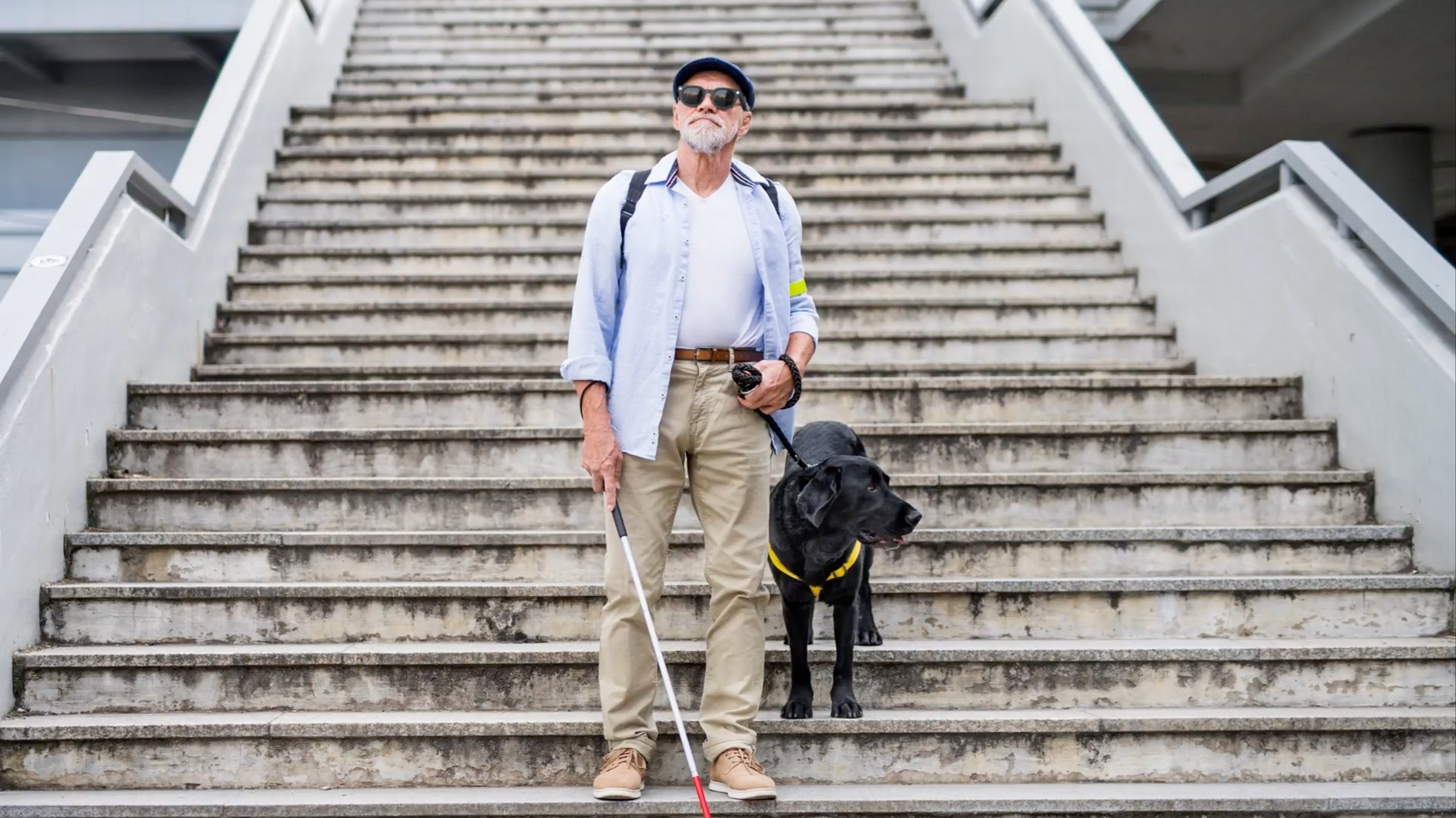International Guide Dog Day.
Respect, Choice, and the Right to Navigate Freely
Today is International Guide Dog Day, a chance to recognise one of the most iconic and life-changing forms of mobility assistance in the world.
Guide dogs are far more than companions. They are highly trained partners that help people with visual impairments navigate the world with confidence, safety, and independence. But what’s often overlooked is that only around 2–10% of blind or visually impaired people actually use guide dogs. Some face long waiting lists or live in regions where training schools and legal protections are limited. Others simply don’t want to work with a dog, and that’s a completely valid choice.
At Hope Tech, we believe in mobility on your own terms. That’s what drives our work on Sixth Sense, a discreet, intuitive wearable designed to support navigation and spatial awareness. Not as a replacement for guide dogs, but as one more option in a world that needs more choices.
An elderly man with a cane and guide dog descends stairs, wearing a blue shirt over a white t-shirt, khaki pants, and brown shoes.
What’s in a Name? The Truth About “Seeing Eye Dogs”
You may have heard guide dogs referred to as “seeing eye dogs.” While that term gets used casually, it actually refers to a specific guide dog school in the United States: The Seeing Eye.
The term may sound descriptive, but it doesn’t capture the complexity of the partnership. Guide dogs don’t “see” for their handlers or choose where to go. Instead, they help navigate around obstacles, respond to commands, and when trained locate key features like doors, crossings, or transport hubs. The person and the dog must work as a team.
That’s why the term “guide team” is more accurate. It reflects the mutual trust and coordination that make the partnership successful.
Respect the Team: Guide Dog Etiquette
When you encounter a guide dog, you’re seeing a working team in action. Just like you wouldn’t grab someone’s cane or push their wheelchair, it’s important to treat guide dog teams with awareness and respect.
Here are a few simple but vital etiquette tips:
Don’t pet, talk to, or distract a working dog. These dogs are doing focused, often high-stakes work. Even calling their name can break their concentration and endanger their handler. Some handlers even give out a fake name when asked the dog's name to avoid this.
Speak to the person, not the dog. You may be drawn to direct your attention to the animal, but always engage with the person.
Don’t offer food or treats. This can interfere with training, cause health issues, and reinforce dangerous behaviour.
Avoid giving commands. There’s no global standard for guide dog commands, and many dogs are trained with personalised cues. Giving the wrong instruction can confuse or disrupt them.
Ask before helping. Whether someone uses a guide dog, a white cane, or any other mobility aid, never assume they need help. A respectful “Would you like assistance?” goes a long way.
These small gestures make a big difference. They protect the autonomy, safety, and dignity of guide teams and ensure the team can do their job with confidence.
Guide Dog Discrimination: More Than a Legal Issue
Earlier this year, a case of discrimination against a guide dog user in Austria reignited an important conversation. Despite clear legal protections, some businesses continue to deny access to people with assistance dogs out of ignorance, bias, or both.
What the law says is clear:
Guide dogs and assistance dogs are legally permitted to accompany their handlers into public spaces. Businesses cannot ask about a person’s disability. At most, they may ask what tasks the dog is trained to perform.
And those tasks vary widely.
While guide dogs help with navigation, other assistance dogs may detect health issues, offer physical support, or intervene in mental health episodes.
This case highlights that legal rights are not enough without public understanding. Discrimination may be illegal, but it’s still happening. We all have a role to play in changing that.
🔗 Read more from the Austrian Disability Council
Spotlight: Guide Dogs UK
In the UK, Guide Dogs UK is one of the leading organisations supporting people with sight loss. While they’re best known for training guide dogs, their work extends well beyond that, offering emotional support, expert advice, and accessible services to individuals and families.
Their mission?
To help people live independently, move freely, and access the world around them with or without a dog.
🎥 Watch this short reel to see their impact in action.
More Than One Path to Independence
On International Guide Dog Day, we honour the bond between people and their guide dogs, a partnership built on trust, training, and shared experience.
But we also acknowledge that guide dogs aren’t for everyone. And they shouldn’t have to be.
That’s why we’re building Sixth Sense, to make independence accessible to more people, in more ways. Whether you rely on a dog, a cane, a wearable, or something else entirely, the goal is the same: Confidence. Mobility. Freedom on your terms.

